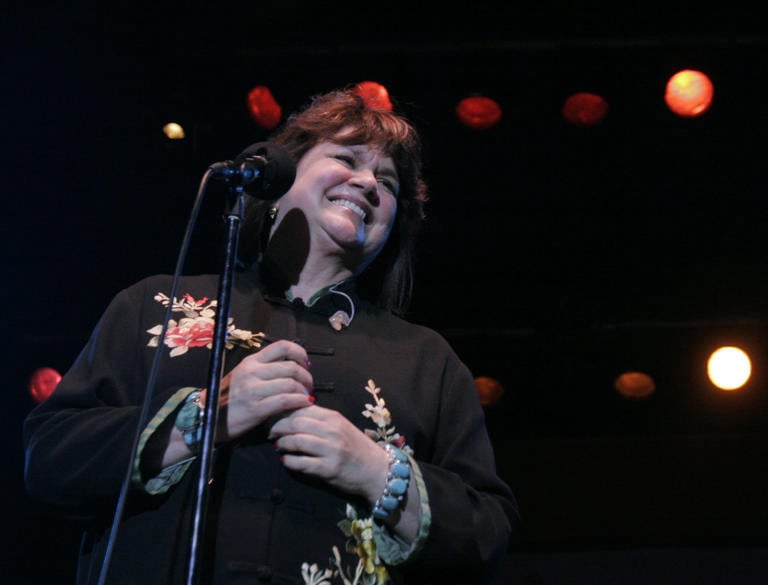
·
Postmedia News
·

·
Postmedia News
·
Recently, I joined about 1,500 people in a cultural
experience that reflected our age — a concert devoted to songs by Linda Ronstadt.
When I bought the tickets, I didn’t think of it as a sentimental journey — the concert wasn’t
delivered by an impressionist, à la Elvis, or a tribute band such as Bohemian Queen. But once inside
the lobby at the 2,500-seat Northern Alberta Jubilee Auditorium in Edmonton, it became apparent that
nostalgia was a key component of the evening, which was attended not exclusively, but largely, by
people with wrinkles.
At first, I felt a bit cringey at the thought of joining a cohort of
folks looking backward. But the evening — a careful curation of Ronstadt’s life and music performed
by top-shelf artists — was so amazing that I couldn’t help but be overtaken by the sheer joy of the
experience.
“When somebody sings a song, I immediately have memories of where I was during that song, good,
bad or otherwise,” says co-producer Graham Neil of GNR Entertainment in an interview about The Story
of Linda Ronstadt. “Music just turns a light switch on. It triggers emotions and all of a sudden
you’re transported.”
The Ronstadt production is just one in a stable of musical biographies that Neil, a digital
media instructor and former CTV entertainment reporter, and his partner Rob Shapiro, an
award-winning musician with the country music group Hey Romeo, have been crafting for the past seven
years. At first, the shows were geared toward a small-town audience. But now, demand has led to gigs
in big cities from Vancouver to Halifax.
All of the shows — including evenings with Creedence
Clearwater Revival, Johnny Cash and Tom Petty — feature memorable music of the past performed by
excellent musicians of the present. There’s always a lead performer from Alberta who not only sings
but tells stories about the profiled artist — stories that are often moving and not that well-known.
Audience members at The Story of Linda Ronstadt heard about the artist’s early efforts to take
control of her career in an industry known for eating its young. We learned about her political
passion projects, her big-name romances, as well as her love for her family (she adopted two
children as a single woman in her 40s). There were stories about the star’s time on Broadway in the
Pirates of Penzance, her recordings with bandleader Nelson Riddle and the unusual decision to make
an album of mariachi music. The show ends with moving insights into Ronstadt’s insecurities about
her place in the music world and how she coped with grace and dignity when a neurological disease
robbed the now-77-year-old of her voice.
“It’s about putting the music into context,” says
Neil, 58. “What does this star’s career and body of work mean to me? And can I connect? That was my
whole thing (with the musical biography series). Can we connect to the audience through a bigger
story?”
The Story of Linda Ronstadt was fronted by Edmonton’s Andrea House — who not only has a voice
that moves easily from country to rock to soul, and in Spanish, but is also an actor. The
combination of talent helps deliver a fully rounded portrayal of Ronstadt, whose vocal range and
flexibility, physically and among genres, makes her one of the standout singers of her generation.
House isn’t imitating Ronstadt, but she has the musical chops to create a powerful emotional link to
the singer’s work.
“Our crowd is not young and we are proud of that,” says Neil. “We are bringing some great
entertainment to an audience that wants to remember, and wants to see those artists in a different
way.”
I tell you all this by way of justifying my own dip into the past. I felt sheepish
about that when I surveyed the auditorium during the Ronstadt concert. It’s a competitive business,
getting older.
There is pressure to keep up with new things and not turn into someone who is always casting
back. I make an effort (thank you, Spotify!) if not to keep up with contemporary music then at least
to cultivate a surface knowledge of the big names. But still, while I can appreciate their talent
and their impact — I’m thinking of you, Taylor Swift — some of the work doesn’t resonate with me.
But when it comes to Ronstadt, my heart melts and I’m not sure exactly why. I was never as
lonesome as the narrator in Blue Bayou and I never had a boyfriend who prompted me to wail “baby,
you’re no good.” Still, Ronstadt’s voice enters my chest cavity like a thunderstorm. It shakes me to
my toes.
Neil puts that deep emotional resonance down, in part, to the tendency as we age to think of the
past and its touchstones with wistful affection.
“Nostalgia is about a happier time, a simpler time, a less complicated time,” says Neil. “Even
if it’s mixed with heartbreak, you feel that, too … In the way that you trigger those core memories
back to people, it’s super powerful.”
It’s human nature to think that the era now gone for good was somehow better. Music connected to
that time takes us there again, however briefly. Linda Ronstadt might be my idol, but she’s also
(give or take a decade or so) my contemporary. How could I not love her and want to be with her
again? We’ve been through so much together.